We welcome ACRS members and all coral reef scientists, practitioners and enthusiasts to participate in our 2024 annual meeting.
Location: University of Western Australia Campus, UWA Club, Perth
Dates: 6th-8th May 2024.
Conference details
Thank you to everyone who was had registered for the conference. We are now on the final countdown and looking forward to seeing you all next week. We have a huge number of presentations on a range of fascinating topics – it’s going to be a great conference!
Please toggle between the tabs below to see more information on the program, agenda and the logistics of attendance.
Quick view:
Conference venue 7th and 8th May – UWA club, building 107, UWA
Poster session 7th May – IOMRC
For an annotated map of UWA Campus map – click here!
ACRS AGM – 8th May 2024. 5.10 pm (AWST; 7.10 pm AEST)
Topic: ACRS AGM 2024
Time: May 8, 2024 17:10 Perth
All members are welcome to join. The zoom link will be sent by email on 8th May
Information for presenters
Presenters
We are currently finalising the program for the conference. If there are any presenters who can no longer make it in person, we would be grateful if you could contact us so we can adjust the program accordingly. We also understand that with another global mass bleaching event, many are required for field work at this time. To ensure that important knowledge sharing opportunities are not missed out on, please contact us if you wish to discuss flexible presentation options (e.g. alternative presenter for previously submitted abstracts)
Acknowledging traditional owners
ACRS acknowledge the tradiation custodians of the land on which we will meet for the conference, and pay our respects to Elders past, present and emerging. We will have a formal welcome to country from a Noongar Elder at the beginning of the meeting. Following discussions with local traditional owners of land and sea country, chairs will acknowledge Elders at the start of each session. An additional recognition of country is not expected in individual presentations.
Poster presentations
The poster session for the conference will run on Tuesday evening in the IOMRC. Posters will be put up during the conference on Tuesday, in preparation for the afternoon session. After the poster session, the posters will then be moved to the main conference location for additional viewing time by delegates during Wednesday’s proceedings.
Posters can be portrait or landscape and will be mounted on boards on which are 1.8m high and 1.2m wide. Please ensure your posters fits within that size frame (i.e. – A0 or smaller).
Conference agenda + program + abstract booklet
Conference agenda
We are delighted to be back in WA for this year’s conference and thank UWA for hosting this event. This year’s conference will have two packed days of talks and discussion, and a society dinner on the evening of the 8th May. In addition, we are offering workshops and WA museum visits the day before the official start of the conference.
Agenda at a glance
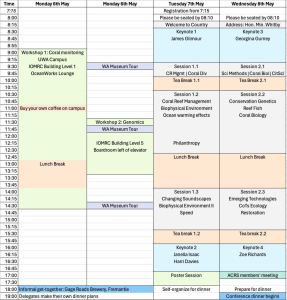
Conference program
The ACRS 2024 conference program provides detailed information on the keynote speakers, the symposia and the abstracts of each of the presentations. Abstracts are listed in alphabetical order. Please note, this is still a draft document and may have minor changes in the lead up to the conference.
Abstract booklet
The ACRS 2024 abstract booklet gives a full list of presenters and abstracts.
ACRS 2024 map
Click here for an annotated map of the UWA campus showing the key conference locations
Monday 6th May
To accommodate interstate travel and evening flight arrivals, this year’s welcome event will be an informal evening gathering to have a few drinks and meet fellow delegates. However, for those wishing to make the most of their travel time, prior to the official start of the conference, we are offering a day of workshops and visits (see pre-conference agenda tab).
- Workshop on Australian coral reef monitoring – the opportunities, benefits and challenges
- MixOmics R-WORKSHOP – Multivariate data integration using R
- WA museum visits
All activities on the 6th are optional. You can chose to opt-in/out when registering for the conference.
Tuesday 7th May
Day 1 of talks at University of Western Australia, Perth. Lunch, morning and afternoon tea are included.
After the conference, there will a poster session at a nearby venue (5-10 minutes walk). This will run from 5pm – 6.30pm. Delegates are then free to make their own dinner and evening plans.
Wednesday 8th May
Day 2 of talks at University of Western Australia, Perth. Lunch, morning and afternoon tea are included.
Our evening event will be a dinner and awards presentation (included in cost of registration)
Keynote speakers
We are delighted to welcome a fantastic group of keynote speakers for the ACRS 2024 conference.
We are very privileged to welcome these speakers to our conference and grateful to them for coming to share their knowledge and ideas with us.
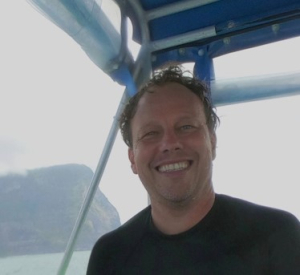
Dr. James Gilmour, Australian Institute of Marine Science, Perth, WA
The state of Western Australia’s coral reefs: past, present and future
James has been studying Western Australia’s coral reefs since 1997. His research is built on collaborations with universities, state and federal agencies and industry. He takes a cross-disciplinary approach to exploring environmental and demographic processes structuring coral communities, to then project future changes and assess competing management strategies. He has a passion for communicating the value of WA’s amazing coral reefs and their plight through climate heating.
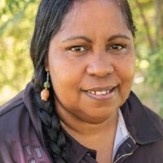
Janella Isaac, Mayala Inninalang Aboriginal Corporation
Navigating the space between Traditional Knowledge and Western Science
Janella Isaac, also traditionally known as Maargkin, speaks passively in her native Bardi language and is a traditional custodian of Mayala. Mayala Country is comprised of a network of over 300 highly biodiverse islands, reefs, interconnecting seas and complex marine areas off the north-west coast of Australia. Her professional role covers an area of Marine Park Co-design and Cultural Governance. She is an Indigenous Consultant by trade and, at present, developing a Cultural Charter to elevate the importance of country management from a cultural perspective. In recognition of her ancestral knowledge, Janella is further developing her specialist skills involved in land management facilitation, caring for country, environmental management, cultural heritage interpretation and protection, sustainability, project management and education.
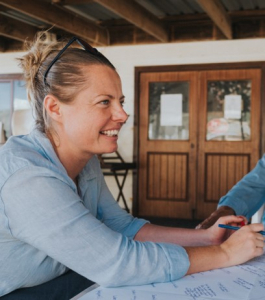
Harri Davies, Sea Country Solutions
Navigating the space between Traditional Knowledge & Western Science
Harri has over a decade of experience in community driven marine research and management planning and is a strong advocate for the importance of respecting cultural knowledge and traditional custodians of Sea Country. She founded Sea Country Solutions in 2020 to foster meaningful marine management outcomes by connecting scientists, knowledge holders, communities, and policy makers.
Harri collaborates with Indigenous communities to help them achieve their goals and aspirations for research and management of their marine environment. She advises researchers on developing two-way research projects and provides policy advice to decision makers. Harri has led and contributed to marine and fisheries management, monitoring, research, and planning projects across communities in Indigenous Australia, the Indian Ocean Territories, Fiji and Indonesia.
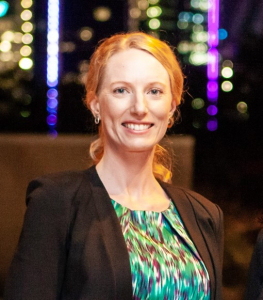
Dr Georgina Gurney, James Cook University
Advancing equity in coral reef conservation science, policy and practice
Georgina is a Senior Research Fellow and an Australian Research Council DECRA Fellow. She is an environmental social scientist whose research on governance integrates geography, sociology, and psychology. Georgina’s current research program explores the institutional drivers and human wellbeing outcomes of conservation and sustainability initiatives, with a particular focus on equity and fairness. Her interdisciplinary approach includes collaborations with biological scientists, and often extends to a transdisciplinary realm, involving knowledge co-production with practitioners and policymakers from the environmental and development sectors. Most of Georgina’s research has focused on coral reef systems in the Asia-Pacific region (particularly in Australia, Indonesia, and Fiji). She has published more than 80 papers and has received multiple awards for her scholarship, including a Fulbright Fellowship (2019), the International Coral Reef Society Early Career Scientist Award (2022), and she was Australia’s nominee for the APEC Science Prize for Innovation, Research and Education (2022).

Associate Professor Zoe Richards, Curtin University, and the Western Australian Museum
Species diversity and resilience: Insights from the Kimberley corals and beyond
Zoe is the Curator of Marine Invertebrate Zoology at the Western Australia Museum and the leader of a Coral Conservation and Research Group (CORE) within the Trace and Environmental DNA Laboratory at Curtin University. With over two decades of experience spanning the fields of taxonomy, molecular systematics, population genetics, ecology, and conservation biology, she applies a unique combination of field experience and quantitative data collection techniques with classical taxonomic training and genetics. By studying and facilitating taxonomic research on marine invertebrate biodiversity, Zoe’s research unveils the intricate web of marine life and underpins effective monitoring and conservation decision-making. She is a Churchill Fellow and a member of the IUCN Coral Specialist Group. She takes pride in collaborating with Aboriginal and Torres Strait Islander communities, notably in the Kimberley region, where she has forged opportunities for meaningful engagement, capacity building and research partnerships.
Pre-conference workshops and field trip - 6th May
This year, the ACRS are delighted to offer two workshops, as well field trips to the WA Museum. These will be run on Monday 6th May, the day before the start of the conference. There is no additional cost for these workshops however places are limited – ensure to register early if you strongly wish to attend! Please be aware that the workshops will run concurrently and so only apply for ONE workshop when registering. Additional details of the workshops are provided below.
UPDATE: All workshops are now FULL
Agenda Monday 6th May
09:00 am – 2.30 pm – Australian coral reef monitoring workshop – opportunities, benefits and challenges. OceanWorks Lounge, IOMRC building, level 2, UWA Campus.
11.30 am – 1.30 pm – MixOmics workshop – Multivariate data integration using R. Boardroom, IOMRC building, level 5, UWA Campus.
9.30 am, 11.45 am and 2 pm – WA Museum Tour (closed shoes are essential), UPDATE: 2pm tour now fully booked!
MixOmics Workshop
MixOmics R-WORKSHOP – Multivariate data integration using R
(18 participants)
Workshop leads:
Patrick Buerger, Cheong Xin Chan
Workshop details:
Advancements in next-generation sequencing methods have revolutionised data generation. Several omics data sets are commonly created in a single experiment, such as transcriptomics, lipidomics, and metabolomics. In this R-workshop, we will introduce the MixOmics package to process multiple omics data sets in a single integrated analysis. Using a published case study of the Breast Cancer Genome Atlas (TCGA Dataset, including miRNA, mRNA, and protein abundances), we will briefly run through some published code and apply different analyses and frameworks, such as PCA, PLS-DA (supervised), sparse PLS-DA (supervised + data reduction), and multiblock sparse PLS-DA (DIABLO). The 2-hour workshop is designed for participants with a foundation in R programming and omics concepts. Although we are using the MixOmics TCGA data, you are more than welcome to bring your own data as well. Please install the following packages before the workshop: mixOmics, tidyverse, and markdown.
Links: http://mixomics.org/mixdiablo/diablo-tcga-case-study
Global Coral Reef Monitoring Network (GCRMN) -ReefCloud Workshop
Australian coral reef monitoring – opportunities, benefits and challenges
(25 participants)
Workshop leads:
Britta Schaffelke, Manuel Gonzalez, Emma Kennedy
Workshop agenda:
- AM: 30 min introduction – 2 hour discussion around an Australian GCRMN node
- Lunch break
- PM: 1 hour practical introduction to ReefCloud platform (laptops required)
Workshop details:
Since 1995, the Global Coral Reef Monitoring Network (GCRMN), an operational network of the International Coral Reef Initiative (ICRI), has nurtured a global community dedicated to coral reef conservation by providing a platform to exchange data and share knowledge, expertise, innovative ideas and diverse perspectives*. The GCRMN operates through 10 regional “nodes”, representing the countries that are custodians of coral reefs across all ocean basins.
While each region has its own priorities and challenges for coral reefs, from protection and resource use to management, governance and research needs, the network that is bound together through the ability to learn from each other and exchange knowledge.
Compared to other GCRMN regions, Australia is not an active regional node in the strict sense. Data across Australian reefscapes are collected for various purposes, including regular reports with various geographic scopes, for example Great Barrier Reef or national State of the Environment reporting. The majority of coral reef monitoring data are collected, analysed and reported by the long-term monitoring program of AIMS, the CSIRO, State departments (e.g., the WA Department of Biodiversity, Conservation and Attractions, DBCA) and citizen science initiatives like Reef Life Survey and Reef Check. Data from many of these providers have also been contributed to the most recent Status of Coral Reefs of the World: 2020 report, produced by the GCRMN.
The workshop aims at exploring opportunities, benefits and challenges in establishing and maintaining and active Australian GCRMN node. Examples of the benefits for improved regional communication and collaboration would be the continued improvement of best practices for coral reef monitoring, and the sharing and integrating data and information at various scales. With this in mind, the second part of the workshop is designed around the benefits around using the ReefCloud platform, including some hands-on exploration of the tools, analysis and visualization products.
Western Australian Museum Aquatic Zoology Collections and Specimen Spotlight Tour
(8 participants per time slot. Participants MUST wear closed shoes)
Name of Organizers:
Marine Invertebrate Curator, Associate Professor Zoe Richards
Head of Aquatic Zoology, Mollusc Curator, Dr Lisa Kirkendale
Head of Science, Associate Professor Jennifer McIllwain
Brief Summary:
The Western Australian Museum Harry Butler Research and Collection Centre houses over 2.5 million wet specimens in custom-build state of the art facilities. Amongst those collections are a plethora of marine and coral reef specimens that have been collected by Curators, Research Associates and Collaborators over the last 100 years. The collection is split into four sections – fishes, molluscs, crustaceans and worms and marine invertebrates (capturing hard corals, soft corals, sponges, echinoderms, anemones, bryozoans, tunicates, jellyfish and more). Collected from remote and tropical locations such as Cocos (Keeling) Islands and the Kimberley, along with isolated southern temperate locations such as Esperance and deep-sea canyons, the highly sought-after collection provides a unique assortment of excellently maintained specimens from the Eastern Indian Ocean and beyond.
The goal of this tour is to introduce visitors to the four Aquatic Zoology collections with the view of initiating new collaborative opportunities and inspiring more taxonomic research on Australian marine biodiversity. The tour will also include a specimen spotlight session where sectional Curators (Dr Glenn Moore, Fishes; Dr Lisa Kirkendale, Molluscs; Dr Andrew Hosie, Crustacea and Worms; A/P Zoe Richards, Marine Invertebrates), will take visitors on a deep dive into the biology and evolution of select rare, unique, or unusual specimens in their care.
Location: Western Australian Harry Butler Research and Collections Centre, 49 Kew Street, Welshpool.
Approximate tour time: 1.5 – 2 hours
Photo competition
Photo Competition
We’ve had many wonderful photographs submitted for this year’s photo competition. The ACRS council members have had the pleasure of judging these submission. During the conference all submitted photos will be displayed and delegates attending the conference will be asked to vote for their favourite photo. The photo receiving the most votes will be awarded the ‘People’s Choice’ award. Awards for each of the categories will be handed out at the conference dinner on Wednesday 8th May.
Accommodation
For delegates requiring accommodation at the conference, there are many options around UWA as well as in the city.
Wonil Hotel is situated close to the conference venue at the University of Western Australia, and have kindly offered a discounted rate for delegates of the ACRS 2024 conference. Below are the booking details to access this discount. You will need to enter a promo code, which will be on your registration acknowledgement email or can be accessed by contacting ACRS.
Property: Wonil Hotel Perth
Discount offered: 10% off Best Available Rate/All room rates
Dates valid: 04/05/2024 – 09/05/2024
Notes:
- All rooms are subject to availability at time of booking. There will be no release backs or inventory updates leading up to check in.
- Promo codes are only valid for bookings made online; and will require full prepayment.
- Bookings will also be subject to any minimum night stay restrictions as listed on the website.
- Online Terms and Conditions apply to these bookings. For full terms & conditions please click here
How to book:
- visit: all.com
- Enter stay details includingHotel Name or Destination, Check in & Check out dates and Room/Guest details
- Click on “More Options” drop down
- Under “Other special rates and promo code” select“promo code” and enter the code as above (case sensitive) and hit “search”
- Discounted rates will be indicated by the red “Special Offer” banner
- Select the hotel and room type you wish to book and hitContinue to proceed to payment screen
- Fill in all required details to confirm your booking and hitConfirm
- You will receive an email confirmation once all details have been processed.
Once booking is confirmed, it can be accessed via My Bookings on the same website or app by logging in using the Reservation number on your confirmation and the Surname on the booking.
Transport in Perth
Public transport around Perth is easy with good access to the conference venue at UWA. Transport from Perth city to the UWA campus is free on the CAT bus and the closest stop to the conference venue is the UWA Guild stop.
The workshops on Monday 6th and poster session on Tuesday 7th will be at the IOMRC building on UWA campus. This is a 5-10 walk from the conference venue. The nearest CAT bus stop is Broadway which will take you to/from the city.
Childcare
Child care facilities will be provided at the conference venue. When you register, you will be able to specify which day/night slots you would like care for your child/ren as well as specifying any particular needs they have.
We are grateful to Minderoo Foundation for covering the cost of this childcare and allowing us to increase the accessibility of the ACRS conference to parents with childcare requirements.
Things to do and places to eat while you’re in Perth
Perth is a beautiful city situated in an amazing historical, cultural and environmental landscape. There are many local activities you might enjoy while visiting Perth for ACRS
If you have additional time to explore while you are in WA for the conference, we have compiled a list of wonderful local attractions you may wish to visit.
Please click here for full details, transport suggestions and helpful links.
Location attractions
- Rottnest Island
- Diving on Rottnest Island or other places
- Cottesloe Beach
- Penguin Island
- Point Peron
- WA Maritime Museum
- Mettam’s Pool
- Kings park and Botanic Gardens
- Fremantle markets
- Swan Valley
- Hiking
- Dryander Woodland
- Lancelin/Cervantes
- Margaret River
- Jurian Bay sea lion swim
Thank you to the sponsors of the ACRS 2024 conference.
Their generosity and support makes this event possible.



